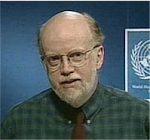In a word: Containment
When the global surveillance system (very likely the media component) first identifies that a pandemic virus has finally emerged, it will likely set in motion an effort by the World Health Organization to contain it at the outbreak site. Containment of a pandemic virus is an untested public health intervention. WHO was forced to embrace the concept of containment when two computer modeling studies published in high profile, peer reviewed journals suggested that -- under the right circumstances -- it might be possible to extinguish the first outbreak of a pandemic virus locally and thus keep it from spreading globally.
WHO set about working out the details of how to do that, and right now it's Global Influenza Program is again revising the so-called "Containment Protocol." This latest iteration of the containment plan is scheduled for release in May. But developing each version of the protocol has been a struggle to marry the theoretical models with the likely reality. Few scientists now believe that containment is actually achievable.
Nevertheless, when a containment effort is launched, it will likely get the full Britney Spears treatment of "Live from the scene" 24-hour-a-day coverage. Intense media coverage, like the containment effort itself, is probably justified since the consequences of a pandemic virus escaping from a containment zone would have broad impact and could be extreme.
This coverage will certainly draw the attention of a new and largely uninformed audience. To date, most of those following the H5N1 story have been public health experts, the poultry industry, Helen Branswell readers, and a few survivalist types who have focused on other threats as H5N1 has, so far, refused to meet its pandemic potential. A containment effort will change that. Very possibly, the world's attention will be riveted on a distant land as WHO and others struggle in spacesuits to prevent what commentators may announce as the first step toward a global calamity.
And with the world watching, containment will likely fail. Almost no expert honestly believes a pandemic can be stopped under the likely outbreak conditions. Too many variables -- biological, cultural, political and logistical -- need to align themselves perfectly for the pandemic to be quenched. Thus, with millions of people rapt with news of containment, the first public health intervention will fail. And this is an enormous communication challenge.
Communication is a public health tool. Building, maintaining or restoring trust is always the first goal of outbreak communication. Trust is the currency of our work. Each communication, like each action, either earns or spends that trust.
In the early stages of a pandemic, little will be available help most people. But a pandemic is a marathon. So it is essential that trust in public health authorities is maintained throughout a pandemic. If their debut is seen as clumsy and inept, trust will be severely strained and that leaves the world more vulnerable to, not just health, but also the social, economic and political consequences of a pandemic.
I believe that the seed of containment's failure is in the word itself. It is a binary word. Something is contained or not. WHO and other institutions and experts have been trapped into using the word because it was associated with the first modeling papers published and the enthusiasm for the possibility generated at that time. They have continued to use the word because the sales pitch of success helps justify the extraordinary and even severe measures that would be asked of populations, governments and agencies during a containment effort.
In the months following publication of the initial papers, understanding of an actual containment process evolved and it became evident that a human influenza pandemic virus was very likely unstoppable. But that same evolution in planning revealed that a pandemic could be slowed, perhaps by weeks. And weeks would certainly provide more time for vaccine production (which has its own problems which I'll outline in a later posting). It also provides time to launch social distancing and other non-pharmaceutical public health interventions such as hand-washing campaigns, home care and the use of masks.
I believe that WHO and others should stop using the word now. What is needed is a word to replace "containment" -- something like delay-ment or restrain-ment. Something is needed that identifies a reasonable goal (to slow the spread of the virus), but does not instantly raise expectations. As I said, expectations are not high among the experts, but with the launch of a containment effort, there will be a new global audience that will be very worried and very hopeful. To me, maintaining the public's trust in health authorities throughout a pandemic is as important as restraining the spread of the virus at the start. An initial, high-profile failure of containment won't help build trust.
A good start could be made right now by renaming the upcoming version of WHO's Containment Protocol.
Saturday, January 5, 2008
Subscribe to:
Post Comments (Atom)

No comments:
Post a Comment